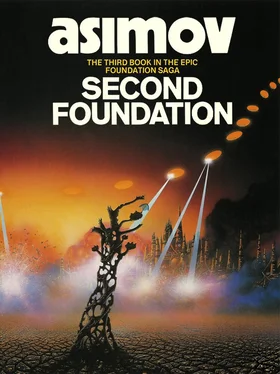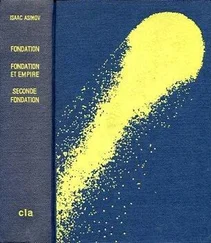It will be pretended therefore, that the First Speaker did actually say, “First, I must tell you why you are here,” instead of smiling just so and lifting a finger exactly thus.
The First Speaker said, “You have studied mental science hard and well for most of your life. You have absorbed all your teachers could give you. It is time for you and a few others like yourself to begin your apprenticeship for Speakerhood.”
Agitation from the other side of the desk.
“No—now you must take this phlegmatically. You had hoped you would qualify. You had feared you would not. Actually, both hope and fear are weaknesses. You knew you would qualify and you hesitate to admit the fact because such knowledge might stamp you as cocksure and therefore unfit. Nonsense! The most hopelessly stupid man is he who is not aware that he is wise. It is part of your qualification that you knew you would qualify.”
Relaxation on the other side of the desk.
“Exactly. Now you feel better and your guard is down. You are fitter to concentrate and fitter to understand. Remember, to be truly effective, it is not necessary to hold the mind under a tight, controlling barrier which to the intelligent probe is as informative as a naked mentality. Rather, one should cultivate an innocence, an awareness of self, and an unselfconsciousness of self which leaves one nothing to hide. My mind is open to you. Let this be so for both of us.”
He went on. “It is not an easy thing to be a Speaker. It is not an easy thing to be a Psychohistorian in the first place; and not even the best Psychohistorian need necessarily qualify to be a Speaker. There is a distinction here. A Speaker must not only be aware of the mathematical intricacies of the Seldon Plan; he must have a sympathy for it and for its ends. He must love the Plan; to him it must be life and breath. More than that, it must even be as a living friend.
“Do you know what this is?”
The First Speaker’s hand hovered gently over the black, shining cube in the middle of the desk. It was featureless.
“No, Speaker, I do not.”
“You have heard of the Prime Radiant?”
“This?”—Astonishment.
“You expected something more noble and awe-inspiring? Well, that is natural. It was created in the days of the Empire, by men of Seldon’s time. For nearly four hundred years, it has served our needs perfectly, without requiring repairs or adjustment. And fortunately so, since none of the Second Foundation is qualified to handle it in any technical fashion.” He smiled gently. “Those of the First Foundation might be able to duplicate this, but they must never know, of course.”
He depressed a lever on his side of the desk and the room was in darkness. But only for a moment, since with a gradually livening flush, the two long walls of the room glowed to life. First, a pearly white, unrelieved, then a trace of faint darkness here and there, and finally, the fine neatly printed equations in black, with an occasional red hairline that wavered through the darker forest like a staggering rillet.
“Come, my boy, step here before the wall. You will not cast a shadow. This light does not radiate from the Radiant in an ordinary manner. To tell you the truth, I do not know even faintly by what medium this effect is produced, but you will not cast a shadow. I know that.”
They stood together in the light. Each wall was thirty feet long, and ten high. The writing was small and covered every inch.
“This is not the whole Plan,” said the First Speaker. “To get it all upon both walls, the individual equations would have to be reduced to microscopic size—but that is not necessary. What you now see represents the main portions of the Plan till now. You have learned about this, have you not?”
“Yes, Speaker, I have.”
“Do you recognize any portion?”
A slow silence. The student pointed a finger and as he did so, the line of equations marched down the wall, until the single series of functions he had thought of—one could scarcely consider the quick, generalized gesture of the finger to have been sufficiently precise—was at eye-level.
The First Speaker laughed softly, “You will find the Prime Radiant to be attuned to your mind. You may expect more surprises from the little gadget. What were you about to say about the equation you have chosen?”
“It,” faltered the Student, “is a Rigellian integral, using a planetary distribution of a bias indicating the presence of two chief economic classes on the planet, or maybe a Sector, plus an unstable emotional pattern.”
“And what does it signify?”
“It represents the limit of tension, since we have here”—he pointed, and again the equations veered—“a converging series.”
“Good,” said the First Speaker. “And tell me, what do you think of all this. A finished work of art, is it not?”
“Definitely!”
“Wrong! It is not.” This, with sharpness. “It is the first lesson you must unlearn. The Seldon Plan is neither complete nor correct. Instead, it is merely the best that could be done at the time. Over a dozen generations of men have pored over these equations, worked at them, taken them apart to the last decimal place, and put them together again. They’ve done more than that. They’ve watched nearly four hundred years pass and against the predictions and equations, they’ve checked reality, and they have learned.
“They have learned more than Seldon ever knew, and if with the accumulated knowledge of the centuries we could repeat Seldon’s work, we could do a better job. Is that perfectly clear to you?”
The Student appeared a little shocked.
“Before you obtain your Speakerhood,” continued the First Speaker, “you yourself will have to make an original contribution to the Plan. It is not such great blasphemy. Every red mark you see on the wall is the contribution of a man among us who lived since Seldon. Why . . . why—” He looked upward, “There!”
The whole wall seemed to whirl down upon him.
“This,” he said, “is mine.” A fine red line encircled two forking arrows and included six square feet of deductions along each path. Between the two were a series of equations in red.
“It does not,” said the Speaker, “seem to be much. It is at a point in the Plan which we will not reach yet for a time as long as that which has already passed. It is at the period of coalescence, when the Second Empire that is to be is in the grip of rival personalities who will threaten to pull it apart if the fight is too even, or clamp it into rigidity, if the fight is too uneven. Both possibilities are considered here, followed, and the method of avoiding either indicated.
“Yet it is all a matter of probabilities and a third course can exist. It is one of comparatively low likelihood—twelve point six four percent, to be exact—but even smaller chances have already come to pass and the Plan is only forty percent complete. This third probability consists of a possible compromise between two or more of the conflicting personalities being considered. This, I showed, would first freeze the Second Empire into an unprofitable mold, and then, eventually, inflict more damage through civil wars than would have taken place had a compromise never been made in the first place. Fortunately, that could be prevented, too. And that was my contribution.”
“If I may interrupt, Speaker—How is a change made?”
“Through the agency of the Radiant. You will find in your own case, for instance, that your mathematics will be checked rigorously by five different boards; and that you will be required to defend it against a concerted and merciless attack. Two years will then pass, and your development will be reviewed again. It has happened more than once that a seemingly perfect piece of work has uncovered its fallacies only after an induction period of months or years. Sometimes, the contributor himself discovers the flaw.
Читать дальше
Конец ознакомительного отрывка
Купить книгу











